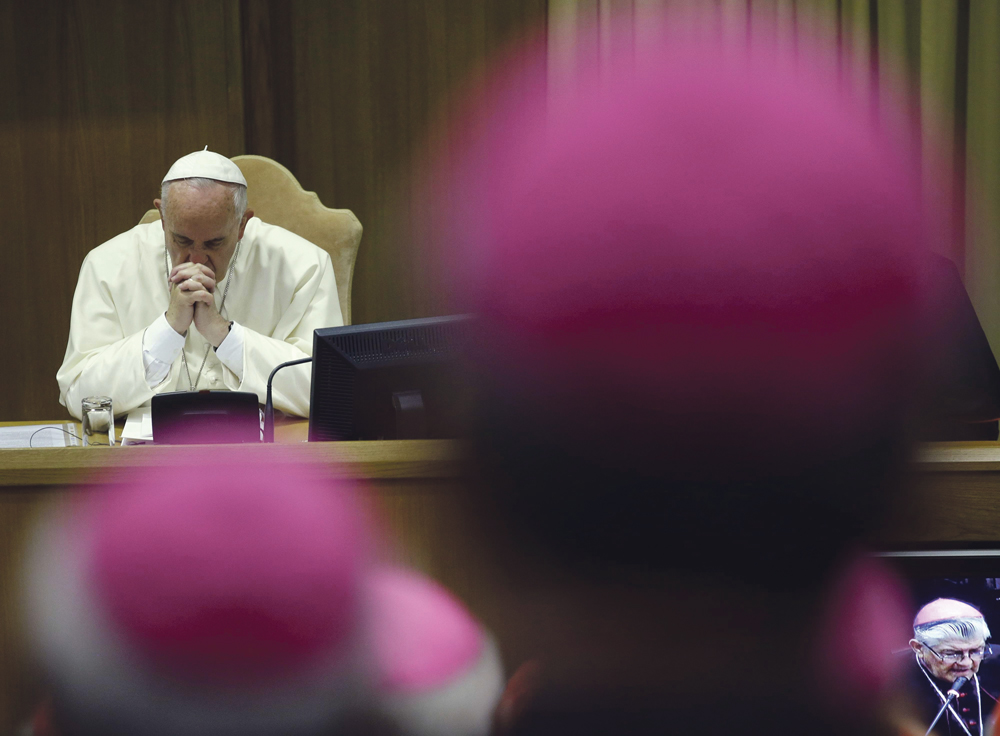Niall Guinan | Contributing Writer
Never was the word “omnishambles” more appropriate than in describing the recent, cumbersomely named “Synod on the Pastoral Challenges to the Family in the Context of Evangelisation” which took place in the Vatican last month. Amidst a farcical media circus, Catholic bishops bickered chaotically for a fortnight on subjects such as homosexuality, cohabitation, and the reception of Holy Communion by divorced and remarried people. The publication of an interim report that gave a great deal of hope to, among others, those of us who are LGBT Catholics, was quickly followed by its withdrawal and modification. It has exposed, in dramatic fashion, the scale of Pope Francis’s task in reconciling conservative and liberal factions in the Church.
The publication of a report that gave a great deal of hope to, among others, those of us who are LGBT Catholics… has exposed, in dramatic fashion, the scale of Pope Francis’s task in reconciling conservative and liberal factions in the Church.
Cardinal Walter Kasper, an 81-year old German cardinal, horrified his conservative colleagues at the beginning of the year by calling for the upcoming Synod to allow Catholics who have been divorced and are now civilly remarried to receive Holy Communion. His call was picked up by the liberal media, provoking a great deal of excitement and misguided expectation about what last month’s Synod would bring. The media paid less attention to Cardinal Kasper when he suggested that African bishops appointed under the previous two conservative Popes were somehow ignorant and close-minded in relation to family issues. In many ways he epitomises the German church, which is enormously wealthy despite facing mostly empty churches on Sundays. It is also enormously arrogant, especially in pushing reforms that do not sit comfortably with Catholics in regions where the Church is actually strong and growing.
American Cardinal Raymond Leo Burke was the conservative figurehead during the Synod. A noted proponent of the Traditional Latin Mass, Cardinal Burke is known for wearing extravagant vestments which, while beautiful and consistent with liturgical norms, look to the uninitiated observer as though they straddle the line separating shameless gaudiness and drag. One of America’s fiercest opponents of abortion and same-sex marriage, he has frequently courted controversy for asking other bishops to refuse Communion to politicians who support abortion and what he calls “anti-family” policies. He also called for Irish politicians who supported the 2013 abortion legislation to be excluded from the sacraments.
Between these two intransigent factions lies the humble Jesuit, Pope Francis, who reportedly remained silent during the heated rows on the Synod floor. He concluded the event by giving a speech in which he begged for reconciliation between the factions he described as “the traditionalists” and “the progressives.” This plea was greeted with a rapturous standing ovation by the gathered bishops who, by all accounts, remain just as uncompromising in their views as ever, rendering any such reconciliation doubtful.
It is very clear with which faction the Pope’s sympathies lie. Shortly after the Synod, he demoted Cardinal Burke from his prestigious position on the Apostolic Signatura (essentially the Supreme Court of the Church) to a new, comparatively insignificant role as patron of the Order of Malta, a profoundly humiliating change of fortunes for the Cardinal.
It is the nature of the Roman Catholic Church to be a cautious, Burkean institution, rather than a radical Jacobin club, when it comes to reform.
It does not appear to be the Pope’s intention to split the Church. He, being the humble man that he is, recognises that his role is as a guardian of tradition, not a radical revolutionary. Monsignor Basil Loftus, a leading “progressive” voice in the Church has written of a “Franciscan Revolution” as transformative as the French Revolution, apparently forgetting that the bloody democide which followed the French Revolution was a calamity for French Catholics who were martyred in the thousands. Such radical change will not be a feature of this pontificate or indeed any other. It is the nature of the Roman Catholic Church to be a cautious, Burkean institution, rather than a radical Jacobin club, when it comes to reform.
It is appropriate that this shambolic Synod ended with the beatification of Paul VI, who was unlucky enough to preside over one of the most chaotic periods in history since the Reformation of the Church. In these stormy times, Pope Francis obviously sees Blessed Paul as something of an inspiration. Cardinal Burke has spoken of a sense of seasickness within the Church. He might take comfort in the passages of the Gospels where the Apostles are feeling seasick. On both these occasions, including the well-known “walking on water” miracle, Jesus comes to comfort the Apostles and calm the storm. It is to be hoped that Jesus will similarly calm the storm at next year’s Synod and inspire the delegates, without bowing Church doctrine to the vicissitudes of public opinion, to explain the Church’s teachings in a way that is more compassionate and more in tune with the those of the Nazarene Carpenter, “meek and humble of heart.”







